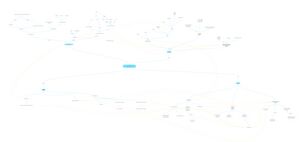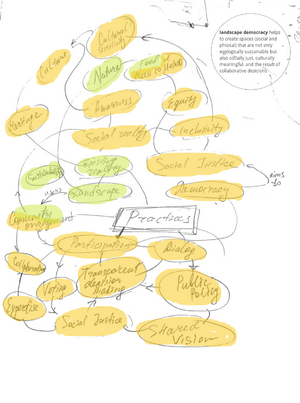Democratic Landscape Transformation 2024 - Team 9: Difference between revisions
| Line 55: | Line 55: | ||
* In how far did the seminar lectures and readings help you to clarify this? | * In how far did the seminar lectures and readings help you to clarify this? | ||
* What will you take home from this seminar? | * What will you take home from this seminar? | ||
Our team shares a common understanding that democratic landscape transformation prioritizes inclusivity, sustainable practices, and community engagement. However, differences exist regarding the degree of community participation, prioritization of issues, and preferred methodologies. Seminar lectures and readings clarified our understanding by providing theoretical frameworks, practical case studies, and diverse perspectives, while seminar discussions fostered critical thinking and deeper insights. From this seminar, we will take home a deeper understanding of democratic landscape transformation, practical tools for community engagement, enhanced critical thinking and collaborative skills, and motivation to apply these principles in my future work. | |||
[[Category:OLA Working Group 2024]] | [[Category:OLA Working Group 2024]] | ||
Revision as of 18:52, 2 July 2024
>>> Back to working group overview
>>> Back to seminar reading list
>>> go to the Editing Help
Background of your team
Please present your team briefly. Which linguistic and cultural perspectives does each member bring in? Which disciplinary backgrounds are present in your team?
- Maria Stergiou was born and raised in the suburbs of Athens, Greece. She has a Master Degree in Architecture Engineering at the National Technical University of Athens (NTUA). What makes her passionate is being part of eco-villages/eco-communities, active urban initiatives and researching about the commons and the public space.
- Atefeh Kheradmand was born in Tehran, Iran. She has a bachelor in interior architecture and after a while she moved to Bologna, Italy. Currently she is studying Architecture and Creative practices in the City and Landscape, which include mostly the subjects around city design and landscape. While previously drawn to the intricacies of interior of architecture, Atefeh now thrives on the challenge of shaping entire cityscapes. This combined expertise allows her to bridge the gap between micro and macro design, ensuring a focus on detail while crafting expansive urban environments.
- Veronika Surovtseva is coming from Chelyabinsk, Russia. She has Master in Architectural Design and worked as Landscape architect for large residential developmennt projects in Ural and Siberia. Later had migration experiences, studied and lived in USA, Turkey and Germany. Passionate about Land-Art. In work focus in Planting as the instrument for creating spaces, designs natural playgrounds and work with local planting communities in urban environment.
- Hi, it's Luca Pacilli: I was born and raised in Cesena, a not very large city an hour away by train from Bologna. I have been studying "Ingegneria edile e architettura" in Bologna since 2018 and I'm in my final year of university. After the lock-down of 2020 and 2021, I had a 6 month experience in Granada, Spain. I chose to attend Landscape education for democracy because it deals with topics that interest me and which I believe are of primary importance in the current situation.
- Cecilia Wangari Mwangi is a Kenyan landscape architect, born and raised in Kenya. She is currently pursuing a Master's degree in Environmental Planning and Development at Jomo Kenyatta University of agriculture and Technology. In addition, she works as a sustainability consultant for a climate justice organization based in Nairobi.
Your Landscape Democracy Manifestoes
Here you can add links to the manifestoes you have presented on April 24. Please make sure that the links are accessible. You can also add them directly here on the wiki, they need to be png or jpg format then.
- https://docs.google.com/presentation/d/1atCyuPADDpWQFR34oUvYZEBE0jdq_elu9goQiP6yl_U/edit#slide=id.p
- https://www.canva.com/design/DAGDVg1LZnM/lKx7TEqRPj3RICnHVLpUlQ/view?utm_content=DAGDVg1LZnM&utm_campaign=designshare&utm_medium=link&utm_source=editor
- Veronika Surovtseva: https://miro.com/app/board/uXjVKQdBtuA=/
- https://drive.google.com/drive/folders/1B7l35lXtoQIZmf_Cchb3iG5xQsJfPolA?usp=drive_link
- https://docs.google.com/presentation/d/1ptDnCKBmN4cZd476sYiFao0zz8HnPqKv/edit?usp=drive_link&ouid=107664713861926607101&rtpof=true&sd=true
Readings, concepts and definitions
- Start: April 3, 2024
- Due: July 2, 2024
While working in your group, please start to express your personal understanding of the relation of landscape and democracy in the form of a concept map with linking words or any other diagrammatic representation. Please make your maps very visual and not just verbal. Think critically about why one map differs from another.
The final product is a shared concept map that integrates the various understandings present within your team.
About concept mapping
Before starting the exercise you can read this article by Joseph D. Novak & Alberto J. Cañas about Theory Underlying Concept Maps and How to Construct and Use Them. This paper gives a good explanation of how concept maps are conceived and developed.
You can use any tool you like for producing your concept map. However, since the result needs to be submitted digitally we recommend the following open source software for producing your maps:
- Cmap Tools >>> you can also work with your group on the Cmap cloud doing a shared map
- VUE - The Visual Understanding Environment
- Use a shared whiteboard to develop your integrated concept map, such as MIRO or MURAL
How to present your concept maps
- Possible format: JPG (for wiki upload) or link to any other resource
- We give you below a draft image gallery where you can add pictures of your map (in JPG or PNG format)
- You can present your integrated understanding as one concept map or your present individual ones and the integrated one.
- add as many additional materials as you need
Overview of your concept maps (individiual and integrated)
Please finish with a short reflection
- What are the similarities and differences in your team regarding your understanding of what democratic landscape transformation is?
- In how far did the seminar lectures and readings help you to clarify this?
- What will you take home from this seminar?
Our team shares a common understanding that democratic landscape transformation prioritizes inclusivity, sustainable practices, and community engagement. However, differences exist regarding the degree of community participation, prioritization of issues, and preferred methodologies. Seminar lectures and readings clarified our understanding by providing theoretical frameworks, practical case studies, and diverse perspectives, while seminar discussions fostered critical thinking and deeper insights. From this seminar, we will take home a deeper understanding of democratic landscape transformation, practical tools for community engagement, enhanced critical thinking and collaborative skills, and motivation to apply these principles in my future work.

